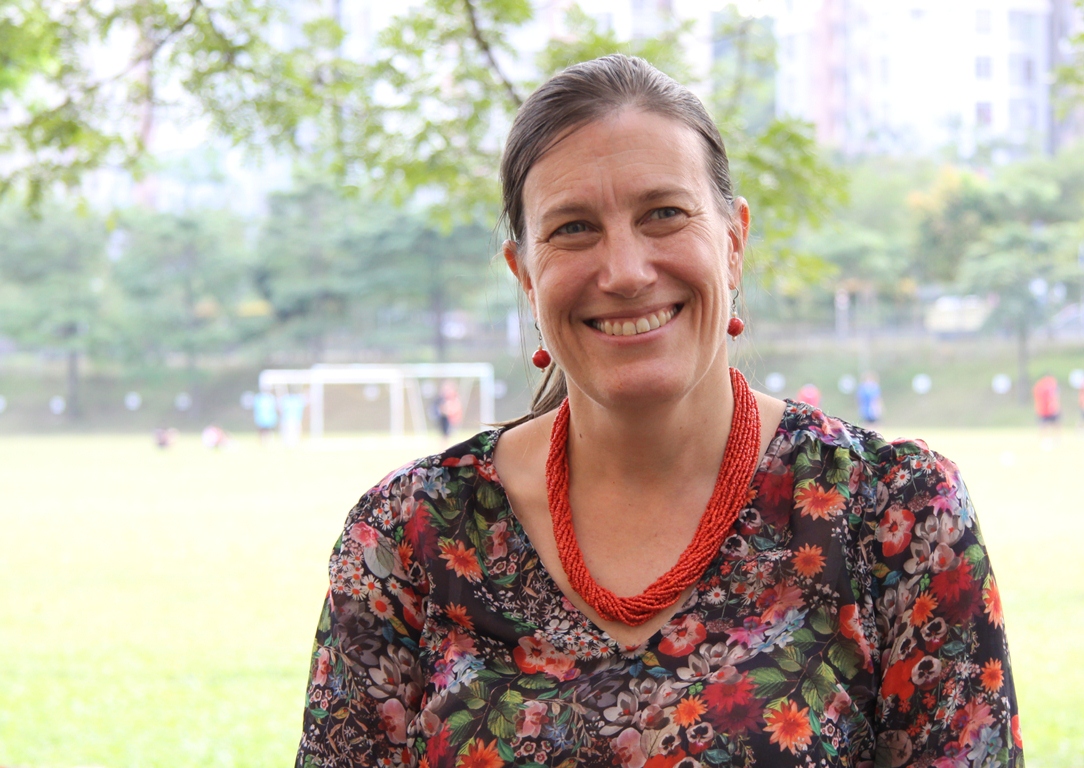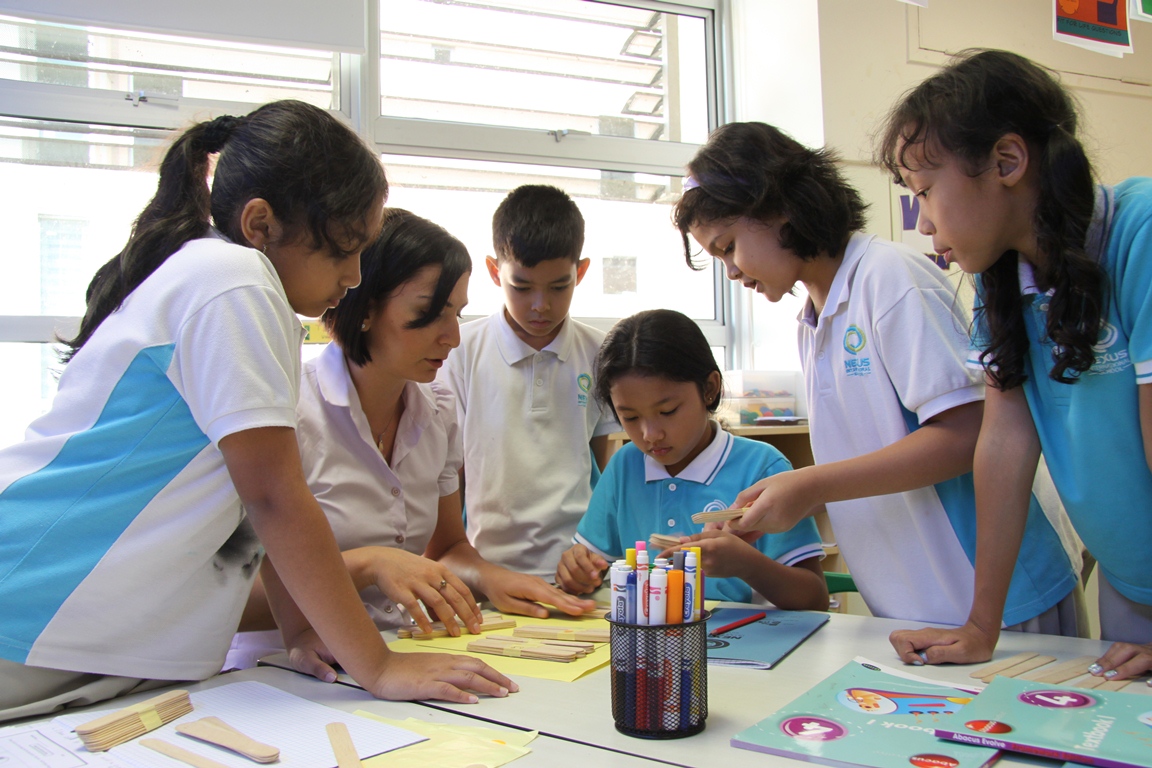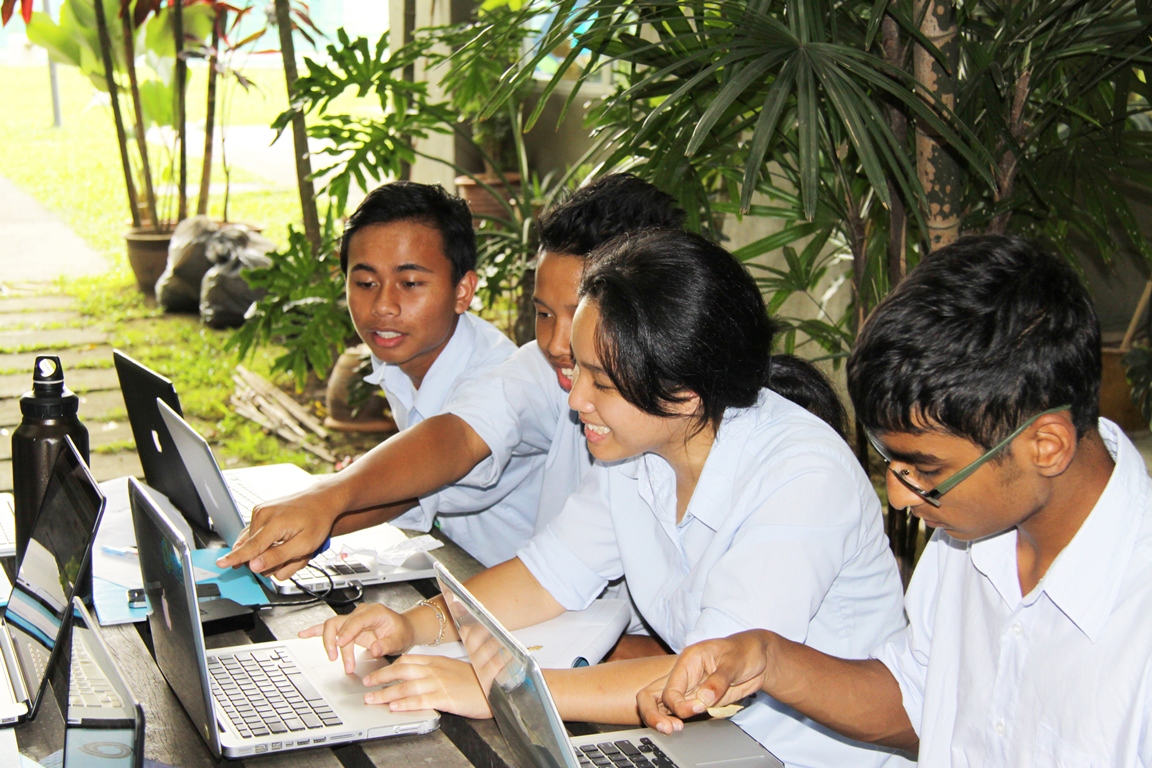Principal Alison Hampshire
A technology-rich school located in the green parklands of Putrajaya sounds like the best of both worlds. Editor Chad Merchant visited the campus and met Principal Alison Hampshire for a tour and explanation of the philosophies behind the success of Nexus International School.
Nexus [neks-suhs] noun: a means of connection, the core or centre of something.
After an afternoon spent at Nexus International School, in the company of Principal Alison Hampshire, it’s not much of a stretch to sort out why this name was chosen for this school. From its inception, the name Nexus was chosen by Taylor’s Education Group to signify the school as a connected learning community with technology at its core. And impressively, Nexus is a community every bit as much as it is a school, there is a genuine sense of inclusiveness, caring, and concern. Not just from the teachers and faculty, but also from the students, or as they are called at Nexus, learners. When I asked about this distinction, Alison pointed out, “We see it as a difference between being a passive student, learning by rote, and being an active, self-regulating learner. We encourage independence and autonomy, and that’s the difference. That’s why our kids are learners.”
Some time spent in the classrooms further explained it. Instead of a teacher standing at a board and lecturing, a handful of students were actually presenting the lesson (and doing it well, I thought), with the teacher and other students actively engaged. It’s 21st-century learning, and it’s part of what goes on every day at Nexus.
The Future is Now
A modern, technology-rich school, Nexus masterfully weaves technology into education, not relying on it, but rather utilising it to make learning more effective, more meaningful. The school boasts not only the expected smart boards and kids wielding iPads and MacBooks, but a full recording studio, green screens and IB film labs, and much more. Technology is simply part of the DNA at Nexus. Alison was quick to point out, however, “Even though we are a technology-rich school, we put a lot of emphasis on holistic learning and of course paper and pen is still king when it comes to exams!”
I asked Alison to talk at greater length about the school’s approach to technology and the part it plays in the learning process. She replied, “The world has changed since we were at school in that the teacher is no longer the source of knowledge: we live in an age of information where you can Google knowledge, so we believe that it necessary to equip young people with the skills to not only access information, but to critically evaluate it.” She continued, “With this end in mind, we cannot ignore the impact of technology on our lives, so we teach them how to be responsible users and consumers in the virtual world, a life skill they will need beyond school.”
When asked for examples of how this technology enhances learning at Nexus, Alison replied, “Well, we have seen that the use of technology empowers and engages our learners, allowing them to be more creative and to personlise their learning. They make use of a range of digital tools to create authentic content such as 3D models and movies, and collaborate to create animations of complex processes, like the water cycle.”
Learning in the 21st Century
She went on to point out that the quality of learning at Nexus draws on more than technology, of course. The campus itself plays its part, too. “Our campus is very green and open with lots of play equipment and space for the learners to be active throughout the day, as well as at break and lunchtimes,” Alison explained. “The campus has more than its fair share of specialist rooms, but also has additional facilities that enable the learners to have authentic learning experiences such as the hydroponic growing lab, butterfly garden, the green screen film room, and recording studio.”
She went on to explain that learning takes many different forms, too, and a school must offer as many different avenues for learning as possible. “The school has personalised learning at its heart, and as such the environment itself encourages this to take place everywhere in many different forms. As well as traditional classrooms, we have deliberately created many different spaces and places for children to learn in different ways. Children snuggle on a bean bag in quiet reflection in the thinking room, share work they are exhibiting in a large learning hub, and sit at café-style tables in the open plan corridors to have group discussions.”
I pressed Alison on the notion of personalised learning, and asked for a more in-depth clarification, and also examples of how Nexus delivers on this point. “Okay, for example, in our Primary school and in some subjects in Secondary, the teachers work collaboratively across the year group and they use the flexible spaces to personalise learning.” I had actually seen this in action, with movable walls allowing two teachers in the same year group to open up the space and collaborate in lessons. Alison continued, “Learners, with teacher guidance, are helped to identify whether they are beginning, developing, or mastering at a particular skill or at a certain level of understanding. Then teachers provide learning advice and activities to enable all learners to make progress and be stretched.”
Setting the IPC Standard in Malaysia
For those of us taught from books and chalkboards, this might all sound a bit new age-y and questionable. But times have changed, and learning today is different than learning in the past. And what cannot be questioned is the results. The learners I saw were engaged and actively participating in their own education. Nexus offers an excellent IB Diploma Programme, is an IPC (International Primary Curriculum) mastering school – in fact recognised as one of the best in the world – and these are just some of its accolades. I asked Alison about the things at which she feels Nexus excels. “Well, as a school that has embedded the use of technology for seven years, we have cutting-edge infrastructure and many staff have been awarded ‘Apple Distinguished Educator’ and ‘Google Educator’ status,” she began. “Additionally, we are one of a handful of schools in Asia – even though many schools deliver it – that have been awarded Mastering status, the highest level, for our delivery of the IPC, and as a result host the IPC Annual Conference, which involves the delegates learning from our outstanding practitioners and looking into our classroom practice. The first cohort of Nexus IB Diploma Programme learners achieve above the world average, and one of our learners was awarded a scholarship to study medicine at Johns Hopkins University. Clearly the quality of learning the children at Nexus are experiencing is high and we want parents to know this.”
So what are some of the challenges she faces? Alison laughed when I asked this question, and I suspected it might have something to do with the school’s location in Putrajaya. Indeed that was the case: “The biggest hurdle I face is our location,” she lamented. “The perception of many is that Putrajaya is so far away. However, we find that when parents and other visitors actually come to Nexus, they are surprised that it is actually a quicker journey than those they regularly make to work or their children’s school. My drive to work is 32 minutes from Bangsar.” I didn’t raise an eyebrow at this, because my drive from our office in Bangsar had been just about the same. “And the benefits of being in Putrajaya are so great it really is worth the journey,” Alison emphasised. “We have so much space and greenery all around. Just outside the school gates is parkland, we have the lake, and the wetlands where we can do field work, water skiing, and IA camps. Even our smallest learners can experience authentic learning when they are learning about shopping just a short walk away.”
Beyond the Classroom
I also met the Director of Boarding, Trevor Schubert, and had a tour of the modern and secure Nexus boarding facilities, which were just as impressive as the school’s. The Boarding facility is extensive: on the ground floor are the offices and the common room where all the learners can socialise, grab snacks, and play pool or table tennis in their free time. Levels 2-6 are the kids’ rooms. The rooms are organised in different combinations from singles for the older learners to quads for the youngest. Each floor has a living room with TV and a small kitchen and is designated for either girls or boys. A house parent apartment is located on each floor. The role of the house parent, as Trevor explained, is to ensure that the learners are safe. They also act in loco parentis, supporting the emotional needs of the learners. In addition, we have a full-time Matron (qualified nurse) who lives in Boarding and is responsible for looking after the physical needs of the learners during their time in the Boarding House.
As Alison pointed out, in talking to the boarders about the experience, they say that it is about learning to live with others and understanding differences in personality, culture, and background. The boarders really do experience what it is to be internationally minded and they learn to “choose respect,” which is the essence of the Boarding House. “Friendships develop quickly, but are deep and long-lasting,” she told me. “Beyond that, boarding offers learners such great opportunities to participate, they contribute so much beyond the classroom and are often the instigators and leaders of the many student-led events such as TEDX, MUN Conferences, recycling, and so on. Our older learners understand they are role models for the younger learners and take this responsibility seriously.”
I asked for more on the “choose respect” point she mentioned, and Alison replied, “There is a real sense of respect and trust here,” at which I interrupted to suggest that must make her job much easier. She laughed and agreed, saying, “At Nexus, we consciously follow a script that enables everyone in the community to take responsibility for their actions, and, in instances where things do go off-track, for restoring harmony. It all builds on our desire to help learners become autonomous, self-regulated learners for life.”
Read This: 5 Ways to Motivate Your Child to Work Hard and Enjoy Their Life
Source: The Expat Magazine March 2015
"ExpatGo welcomes and encourages comments, input, and divergent opinions. However, we kindly request that you use suitable language in your comments, and refrain from any sort of personal attack, hate speech, or disparaging rhetoric. Comments not in line with this are subject to removal from the site. "

























